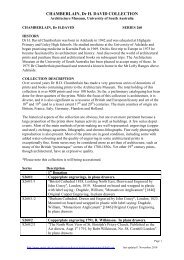Foucault, gay, subjectivity and the microsociology of emotions
Foucault, gay, subjectivity and the microsociology of emotions
Foucault, gay, subjectivity and the microsociology of emotions
You also want an ePaper? Increase the reach of your titles
YUMPU automatically turns print PDFs into web optimized ePapers that Google loves.
<strong>Foucault</strong>, <strong>gay</strong>, <strong>subjectivity</strong> <strong>and</strong> <strong>the</strong> <strong>microsociology</strong> <strong>of</strong> <strong>emotions</strong><br />
Alex<strong>and</strong>er Lambevski<br />
Abstract<br />
The paper briefly maps <strong>the</strong> main contours <strong>and</strong> consequences <strong>of</strong> <strong>the</strong><br />
queer embrace <strong>of</strong> <strong>Foucault</strong>’s open attack against psychology <strong>and</strong><br />
psychoanalysis. The queer scholars’ refusal to provide a model <strong>of</strong> <strong>gay</strong><br />
<strong>subjectivity</strong> (for fear <strong>of</strong> contaminating <strong>the</strong>ir analyses with <strong>the</strong><br />
insidious disciplining <strong>and</strong> normalising effects <strong>of</strong> psychology) has<br />
resulted in a virtual embargo on any meaningful investigation <strong>of</strong><br />
queer subjectivities. This has proven extremely shortsighted,<br />
particularly in <strong>the</strong> area <strong>of</strong> HIV/AIDS social <strong>the</strong>ory <strong>and</strong> activism.<br />
Using as points <strong>of</strong> departure Halperin’s book What do <strong>gay</strong> men want?<br />
(2007), <strong>the</strong> paper hints at how <strong>the</strong> <strong>microsociology</strong> <strong>of</strong> <strong>emotions</strong> can be<br />
used to fill a conceptual vacuum in <strong>Foucault</strong>’s underst<strong>and</strong>ing <strong>of</strong> <strong>the</strong><br />
relationship between <strong>the</strong> government <strong>of</strong> self, discourses <strong>of</strong><br />
power/knowledge <strong>and</strong> <strong>the</strong> government <strong>of</strong> o<strong>the</strong>rs, thus providing a<br />
lifelike <strong>and</strong> dynamic model <strong>of</strong> <strong>gay</strong> <strong>subjectivity</strong>.
The problem with killing <strong>of</strong>f psychology<br />
‘The entire art <strong>of</strong> life consists <strong>of</strong> killing <strong>of</strong>f psychology’ declared <strong>Foucault</strong> in 1981 (Defert &<br />
Ewald 1994, p. 256; Halperin 2007, p. 4). This epigrammatic statement vividly captures <strong>the</strong><br />
political <strong>and</strong> ethical attitude shared by so many lesbians, <strong>gay</strong> men <strong>and</strong> o<strong>the</strong>r queer scholars<br />
<strong>and</strong> activists <strong>of</strong> his generation ‘who, like him, had spent a lifetime struggling against <strong>the</strong>ir<br />
own sense <strong>of</strong> psychological deviance’ (Halperin 2007, p. 4), <strong>and</strong> who spent enormous energy<br />
fending <strong>of</strong>f ‘<strong>the</strong> unflattering judgments <strong>of</strong> psychological experts <strong>and</strong> … [dodging] <strong>the</strong><br />
constant, perennial accusations <strong>of</strong> perversion, sickness, [<strong>and</strong>] abnormality’ (p. 5). Legions <strong>of</strong><br />
<strong>gay</strong>, lesbian, transsexual <strong>and</strong> queer scholars had thus very good political reasons to embrace<br />
<strong>Foucault</strong>’s attack against <strong>the</strong> ‘inordinate authority [<strong>of</strong> ego <strong>and</strong> depth psychology, <strong>and</strong><br />
psychoanalysis] in criminal <strong>and</strong> judicial matters, legal determination <strong>of</strong> competency for a<br />
range <strong>of</strong> behaviors, <strong>and</strong> <strong>the</strong> promulgation <strong>of</strong> “universal human norms” imposed as measures<br />
<strong>of</strong> judgment on us all’ (Alc<strong>of</strong>f 1996, p. 120).<br />
It is worth noting here briefly some <strong>of</strong> <strong>the</strong> main contours <strong>and</strong> consequences <strong>of</strong> this attack<br />
against psychology <strong>and</strong> psychoanalysis in <strong>the</strong> field <strong>of</strong> lesbian <strong>and</strong> <strong>gay</strong> studies. Queer scholars<br />
completely backgrounded <strong>gay</strong> <strong>subjectivity</strong> in favour <strong>of</strong> <strong>gay</strong> identity as <strong>the</strong> only politically<br />
desirable topic for queer-friendly research, fearing that any ‘disquieting <strong>and</strong> potentially<br />
discreditable details <strong>of</strong> <strong>gay</strong> <strong>subjectivity</strong>’ (Halperin 2007, p. 5) may harm <strong>the</strong> campaign for<br />
lesbian <strong>and</strong> <strong>gay</strong> equality. The success <strong>of</strong> this campaign depended on creating a politically<br />
palatable discursive representation <strong>of</strong> lesbians <strong>and</strong> <strong>gay</strong>s in order to gain support from<br />
reasonable straight people, mostly progressive liberals <strong>and</strong> social democrats, who could be<br />
moved to ‘tolerate [lesbians <strong>and</strong> <strong>gay</strong>s], or at least not to mistreat <strong>the</strong>m, when one appeals to<br />
[<strong>the</strong>] basic sense <strong>of</strong> fairness <strong>and</strong> decency [<strong>of</strong> <strong>the</strong> straight majority]’ (Halperin 2007, p. 5). It is<br />
for <strong>the</strong>se reasons that <strong>the</strong> lesbian <strong>and</strong> <strong>gay</strong> movement <strong>of</strong>fered a ‘remarkably plausible <strong>and</strong><br />
persuasive new definition <strong>of</strong> homosexuality in political ra<strong>the</strong>r than psychological terms’<br />
(Halperin 2007, p. 2).<br />
Reinventing homosexuality as a political collective identity meant that lesbians <strong>and</strong> <strong>gay</strong> men<br />
were no longer social deviants, but ‘normal people’ similar to ‘any ethnic or religious group<br />
that is socially marked by its perceived difference from regular folks’ (Halperin 2007, pp. 2–<br />
3). This political strategy has had huge political pay<strong>of</strong>fs as witnessed by <strong>the</strong> assimilation <strong>of</strong><br />
mostly middle-class white <strong>gay</strong>s <strong>and</strong> lesbians into mainstream society <strong>and</strong> gaining a<br />
1
citizenship status almost equal to those <strong>of</strong> heterosexuals in most countries <strong>of</strong> <strong>the</strong> West<br />
(Weeks 1998; Plummer 2001; Seidman 2001; Stychin 2001; Oleksy, 2009). It is no wonder<br />
<strong>the</strong>n that any <strong>gay</strong> scholar daring to investigate <strong>gay</strong> <strong>subjectivity</strong> is greeted by politically savvy<br />
<strong>gay</strong>s <strong>and</strong> lesbians with a great deal <strong>of</strong> anxiety <strong>and</strong> sometimes outright hostility (Farmer<br />
2000).<br />
Psychology <strong>and</strong> psychoanalysis had become hegemonic master sciences <strong>of</strong> <strong>the</strong> human subject<br />
in <strong>the</strong> last two centuries, with a well-established conceptual toolbox to talk about <strong>the</strong> inner<br />
structure <strong>of</strong> our affects, motivations <strong>and</strong> experiences. Given this context, <strong>the</strong> queer refusal to<br />
seriously engage with issues <strong>of</strong> <strong>gay</strong> <strong>subjectivity</strong> for fear that <strong>the</strong> topic is inherently tainted by<br />
<strong>the</strong> disciplining <strong>and</strong> normalising effects <strong>of</strong> its privileged psychological <strong>and</strong> psychoanalytic<br />
framing (Halperin 2007, p. 11) meant that queer scholars did not have an alternative<br />
conceptual apparatus sufficiently <strong>and</strong> substantially developed to compete with psychoanalysis<br />
<strong>and</strong> psychology on <strong>the</strong> issue <strong>of</strong> queer <strong>subjectivity</strong>. Treating <strong>gay</strong> <strong>subjectivity</strong> simply as a<br />
discursive mirage, a byproduct <strong>of</strong> <strong>the</strong> discourses on sexualities that developed in <strong>the</strong> last 180<br />
or so years, proved to be a liability ra<strong>the</strong>r than an asset when it came to informing <strong>gay</strong>inflected<br />
social inquiry aimed at providing pragmatic <strong>and</strong> workable solutions for <strong>the</strong><br />
HIV/AIDS crisis affecting <strong>gay</strong> men. Without an alternative working model <strong>of</strong> what motivates<br />
human/social action, including unprotected sex between <strong>gay</strong> men, Foucauldian queer scholars<br />
ceded considerable conceptual <strong>and</strong> <strong>the</strong>oretical ground to psychology <strong>and</strong> psychoanalysis in<br />
<strong>the</strong> area <strong>of</strong> HIV/AIDS activism, since <strong>the</strong> latter already have readymade docking stations to<br />
slot in all sorts <strong>of</strong> largely unexamined <strong>and</strong> highly speculative judgments about normative<br />
psychological health, <strong>and</strong> pathological <strong>gay</strong> motivations <strong>and</strong> behaviours. Simply recovering<br />
<strong>and</strong> exposing exclusions <strong>of</strong> <strong>the</strong> homosexual in various discursive structures <strong>of</strong><br />
power/knowledge (<strong>Foucault</strong> 1980) is not enough when trying to underst<strong>and</strong> <strong>gay</strong> sexual<br />
situational behaviour. A microsocial <strong>the</strong>ory <strong>of</strong> what makes risky sex a particularly attractive<br />
interaction ritual (Collins 2004) for some <strong>gay</strong> men is urgently needed.<br />
One <strong>of</strong> <strong>the</strong> fundamental conceptual problems with <strong>Foucault</strong>’s view <strong>of</strong> <strong>gay</strong> <strong>subjectivity</strong> is in<br />
underst<strong>and</strong>ing how <strong>the</strong> homosexual, who constitutes herself as a subject through <strong>the</strong><br />
‘scientific’ discourses on sexuality that include psychology <strong>and</strong> psychoanalysis, <strong>and</strong> who<br />
organises her experience <strong>of</strong> herself through what <strong>the</strong>se discourses <strong>of</strong>fer her, can feel<br />
oppressed by those same discourses <strong>and</strong> hence resist <strong>the</strong>m. If one was solely a byproduct <strong>of</strong><br />
2
particular discursive structure, <strong>the</strong>n where does <strong>the</strong> feeling <strong>of</strong> being oppressed by it <strong>and</strong> <strong>the</strong><br />
desire <strong>and</strong> will to resist it come from? There is something that happens in <strong>the</strong> process <strong>of</strong><br />
subjective translation <strong>of</strong> ‘objective’ discourses into subjective experience <strong>and</strong> practice that is<br />
unaccounted for within <strong>Foucault</strong>’s view <strong>of</strong> <strong>subjectivity</strong> (<strong>Foucault</strong> 2005) <strong>and</strong> that hints at a<br />
human subject that is ‘part <strong>of</strong> <strong>the</strong> larger field <strong>of</strong> social power without however being<br />
reducible to it’ (Halperin 2007, p. 105). This thing that is socially constructed, but not<br />
entirely, is emotion (Reddy 2001), <strong>and</strong> this is precisely <strong>the</strong> topic <strong>of</strong> a book by a leading<br />
Foucauldian <strong>gay</strong> scholar, David Halperin.<br />
Foregrounding <strong>gay</strong> <strong>subjectivity</strong> through <strong>the</strong> <strong>microsociology</strong> <strong>of</strong> <strong>gay</strong> <strong>emotions</strong><br />
Humans, including <strong>gay</strong> men, have very limited cognitive capacities, <strong>and</strong> in a time-pressured<br />
world <strong>of</strong> ‘confusion, uncertainty <strong>and</strong> stress’ (Halperin 2007, p. 108), people make decisions<br />
by reducing alternatives <strong>and</strong> avoiding complex decisions by choosing whatever feels best or<br />
least worst based on previous experience. How risky sex, through abjection, becomes a<br />
thrilling cognitive symbol loaded with great emotional energy (Collins 2004) is <strong>the</strong> focus <strong>of</strong><br />
Halperin’s What do <strong>gay</strong> men want? (2007). I will paraphrase one <strong>of</strong> Halperin’s main points<br />
here in <strong>the</strong> following way: risky sex as an interaction ritual is a ‘mechanism <strong>of</strong> mutually<br />
focused emotion <strong>and</strong> attention’ (Collins 2004, p. 8) that produces a momentarily shared<br />
reality between <strong>gay</strong> men <strong>the</strong>reby generating solidarity among pariahs <strong>and</strong> symbols <strong>of</strong><br />
belonging to an abjected social group (Collins 2004, p. 8).<br />
For Halperin, abjection is one <strong>of</strong> <strong>the</strong> underlying structural elements <strong>of</strong> <strong>the</strong> affective structure<br />
<strong>of</strong> <strong>gay</strong> men, whereby ‘<strong>gay</strong> <strong>subjectivity</strong> is divided against itself, formed in stigma, in rejection<br />
by o<strong>the</strong>rs – especially by those whom one desires – <strong>and</strong> by oneself’ (Halperin 2007, p. 69).<br />
Halperin is consistently sociological in his approach to underst<strong>and</strong>ing <strong>the</strong> social operations <strong>of</strong><br />
abjection <strong>and</strong> convincingly shows that abjection ‘does not originate in psychic causes’ (p.<br />
69), <strong>and</strong> that it is a collective <strong>gay</strong> emotion arising as a consequence <strong>of</strong> <strong>the</strong> heterosexist<br />
society’s collective judgment against <strong>gay</strong> people, only fur<strong>the</strong>r exacerbated by <strong>the</strong> HIV/AIDS<br />
crisis (p. 69), <strong>and</strong> a ‘dynamic social process constitutive <strong>of</strong> <strong>the</strong> <strong>subjectivity</strong> <strong>of</strong> <strong>gay</strong> men’ (p.<br />
77).<br />
Abjection is also <strong>the</strong> <strong>gay</strong> men’s strategic response to <strong>the</strong>ir oppression <strong>and</strong> pathologisation by<br />
a society that despises <strong>the</strong>m, a<br />
3
socially constituted affect that can intensify <strong>the</strong> determination to survive, can<br />
conduce to sexual inventiveness, <strong>and</strong> can lead to <strong>the</strong> creation <strong>of</strong> various<br />
devices for extracting heightened pleasure, <strong>and</strong> even love, from experiences<br />
<strong>of</strong> pain, fear, rejection, humiliation, contempt, shame, brutality, disgust, or<br />
condemnation. (Halperin 2007, p. 93)<br />
By seriously examining <strong>the</strong> emotional nature <strong>of</strong> <strong>the</strong> process <strong>of</strong> subjection or resistance to<br />
various discourses <strong>of</strong> power/knowledge (<strong>Foucault</strong> 1980), by demonstrating that <strong>the</strong> relation <strong>of</strong><br />
oneself to oneself (<strong>Foucault</strong> 1990) is a site <strong>of</strong> intense emotional struggle, <strong>and</strong> by showing<br />
how through <strong>the</strong> self-altering <strong>and</strong> exploratory effects <strong>of</strong> emotional expression (Reddy 2001,<br />
p. 128) one can modify <strong>the</strong> intensity or even <strong>the</strong> intended effects <strong>of</strong> a particular system <strong>of</strong><br />
domination, Halperin provides <strong>the</strong> first necessary, although still not sufficiently<br />
microsociological, steps for building a <strong>the</strong>ory <strong>of</strong> <strong>the</strong> social dynamics <strong>of</strong> <strong>the</strong> <strong>gay</strong> microworld.<br />
He thus grounds <strong>Foucault</strong>’s techniques <strong>of</strong> <strong>the</strong> self <strong>and</strong> his notion <strong>of</strong> <strong>the</strong> microphysics <strong>of</strong><br />
power (<strong>Foucault</strong> 1980, pp. 55–62) in <strong>the</strong> microsocial reality <strong>of</strong> <strong>the</strong> here <strong>and</strong> now <strong>of</strong> how<br />
actual <strong>gay</strong> men (like Jean Genet, Catholic <strong>gay</strong> writer Marcel Jouh<strong>and</strong>eau, <strong>and</strong> <strong>gay</strong> writer <strong>and</strong><br />
porn star Scott O’Hara) appropriated or practiced moral <strong>and</strong> o<strong>the</strong>r discourses <strong>of</strong><br />
power/knowledge.<br />
Halperin provides an exciting opening for a new queer Foucauldian research agenda by<br />
seriously tending to <strong>the</strong> issue <strong>of</strong> what <strong>Foucault</strong> called ‘<strong>the</strong> contradictory movements <strong>of</strong> soul’<br />
(1990, p. 26), <strong>the</strong> emotional struggle involved in how <strong>gay</strong> men ‘comply more or less fully<br />
with a st<strong>and</strong>ard <strong>of</strong> conduct [prescribed by <strong>the</strong> hygienic discourses <strong>of</strong> public health], <strong>the</strong><br />
manner in which <strong>the</strong>y obey or resist an interdiction or prescription’ (p. 25).<br />
However, Halperin’s failure to engage with any <strong>of</strong> <strong>the</strong> research on <strong>emotions</strong> taking place in<br />
anthropology (Wikan 1990), history (Reddy 2001) <strong>and</strong> sociology (Barbalet 2002; Turner &<br />
Stets 2005), particularly in <strong>the</strong> field <strong>of</strong> <strong>the</strong> <strong>microsociology</strong> <strong>of</strong> <strong>emotions</strong> (Collins 2004; Scheff<br />
1994), deprives him <strong>of</strong> <strong>the</strong> great opportunity to use richly developed conceptual toolkits <strong>and</strong><br />
insights, <strong>and</strong> thus make a clearer <strong>and</strong> more straightforward organic connection to <strong>the</strong><br />
lifeworld <strong>of</strong> <strong>gay</strong> men. The spiritualised framing <strong>of</strong> his analysis <strong>of</strong> <strong>the</strong> social roots <strong>of</strong> <strong>gay</strong><br />
abjection is too mystifying to be translated into a concrete research agenda or plan for<br />
political action. As Scheff points out, rarefied <strong>and</strong> mystifying analysis ‘without [a clear]<br />
4
organic connection to <strong>the</strong> lifeworld has had uncertain <strong>and</strong> only sporadic influence in <strong>the</strong><br />
struggles <strong>of</strong> <strong>the</strong> ruled groups, <strong>the</strong> working class, students, women, [<strong>gay</strong> men] <strong>and</strong> <strong>the</strong><br />
consumers <strong>of</strong> pr<strong>of</strong>essional services’ (Scheff 1990, p. 101).<br />
Alex<strong>and</strong>er Lambevski is a founding editor <strong>and</strong> publisher <strong>of</strong> Sextures, an online international<br />
refereed academic journal for sexualities, cultures <strong>and</strong> politics, <strong>and</strong> an independent scholar<br />
from Sydney. He has published numerous refereed journal articles <strong>and</strong> book chapters, <strong>and</strong><br />
currently is working on a book on queer <strong>emotions</strong> <strong>and</strong> sexual citizenship. alex@sextures.net<br />
or alex@m<strong>and</strong>rakeatm.com<br />
5
References<br />
Alc<strong>of</strong>f, LM 1996, Real knowing: new versions <strong>of</strong> <strong>the</strong> coherence <strong>the</strong>ory, Cornell University<br />
Press, Ithaca.<br />
Barbalet, J (ed.) 2002, Emotions <strong>and</strong> sociology, Blackwell Publishing, Oxford.<br />
Collins, R 2004, Interaction ritual chains, Princeton University Press, Princeton.<br />
Defert, D & Ewald, F (eds.) 1994, Dits et écrits 1954–1988, Gallimard, Paris.<br />
Farmer, B 2000, Spectacular passions: cinema, fantasy, <strong>gay</strong> male spectatorship, Duke<br />
University Press, Durham.<br />
<strong>Foucault</strong>, M 2005, Hermeneutics <strong>of</strong> <strong>the</strong> subject: lectures at <strong>the</strong> College de France, 1981–<br />
1982, trans. G Burchell, Picador, New York.<br />
<strong>Foucault</strong>, M 1990, The use <strong>of</strong> pleasure: <strong>the</strong> history <strong>of</strong> sexuality, vol. 2, R<strong>and</strong>om House, New<br />
York.<br />
<strong>Foucault</strong>, M 1980, Power/knowledge, trans. C Gordon, L Marshall, J Mepham & K Soper,<br />
Harvester Wheatsheaf, New York.<br />
Halperin, D 2007, What do <strong>gay</strong> men want? An essay on sex, risk, <strong>and</strong> <strong>subjectivity</strong>, University<br />
<strong>of</strong> Michigan Press, Ann Arbor.<br />
Oleksy, E 2009, Intimate citizenships: gender, sexualities, politics, Routledge, London.<br />
Plummer, K 2001, ‘The square <strong>of</strong> intimate citizenship: some preliminary proposals’,<br />
Citizenship Studies, vol. 5, no. 3, pp. 237–253.<br />
Reddy, W 2001, The navigation <strong>of</strong> feeling: a framework for <strong>the</strong> history <strong>of</strong> <strong>emotions</strong>,<br />
Cambridge University Press, Cambridge.<br />
Scheff, T 1990, Microsociology: discourse, emotion <strong>and</strong> social structure, University <strong>of</strong><br />
Chicago Press, Chicago.<br />
Seidman, S 2001, ‘From identity to queer politics: shifts in normative heterosexuality <strong>and</strong> <strong>the</strong><br />
meaning <strong>of</strong> citizenship’, Citizenship Studies, vol. 5, no. 3, pp. 321–328.<br />
Stychin, CF 2001, ‘Sexual citizenship in <strong>the</strong> European Union’, Citizenship Studies, vol. 5, no.<br />
3, pp. 285–301.<br />
Turner, J & Stets, J 2005, The sociology <strong>of</strong> <strong>emotions</strong>, Cambridge University Press,<br />
Cambridge.<br />
Weeks, J 1998, ‘The sexual citizen’, Theory, Culture & Society, vol. 15, no. 3, pp. 35–52.<br />
Wikan, U 1990, Managing turbulent hearts: a Balinese formula for living, University <strong>of</strong><br />
Chicago Press, Chicago.<br />
6


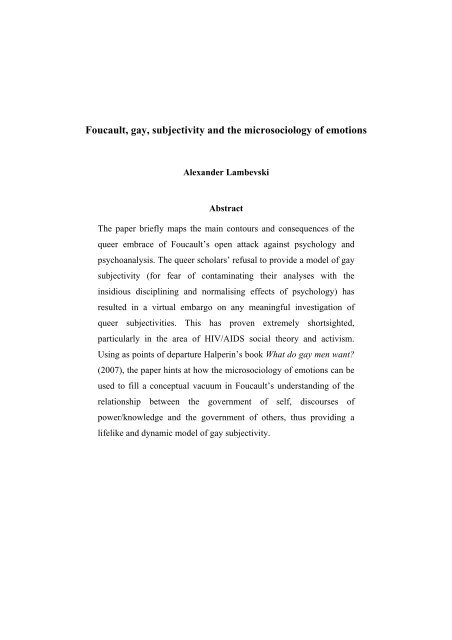
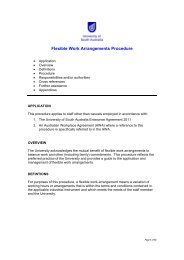



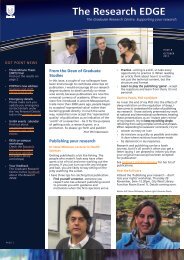
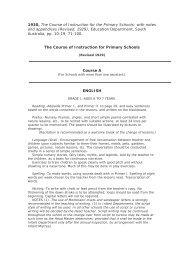
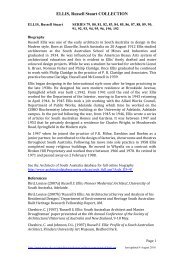

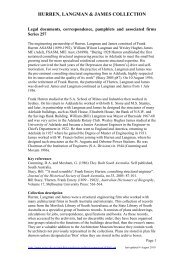
!['The Asian Delegation Chooses […] the Wu-Tang Clan!'—](https://img.yumpu.com/7767765/1/184x260/the-asian-delegation-chooses-the-wu-tang-clan.jpg?quality=85)

